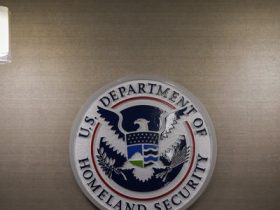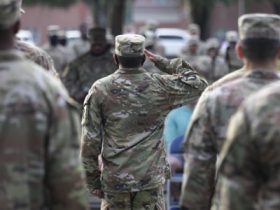Trump’s first day back
The U.S. military must produce a plan to “seal the borders” under an executive order signed Monday by President Donald Trump, Defense One’s Bradley Peniston reports. Under the 665-word order, the U.S. defense secretary has 10 days to “deliver to the President a revision to the Unified Command Plan that assigns United States Northern Command (USNORTHCOM) the mission to seal the borders.” That order followed an earlier one declaring the illegal border crossings a national emergency.
American troops are now tasked with “repelling forms of invasion including unlawful mass migration, narcotics trafficking, human smuggling and trafficking, and other criminal activities,” according to Trump’s order.
However, one expert suggested the order might not stand up to legal scrutiny for several reasons, including that “invasion” may not be a legally accurate way to describe the border situation. Although courts are traditionally hesitant to second-guess a president on political questions, Elizabeth Goitein of the Brennan Center’s Liberty and National Security Program said, the Supreme Court “has in various contexts said…there is a permissible range of honest judgment that a president can overstep. And my sincere hope is that the Supreme Court would not tolerate the president using the rhetorical language of ‘invasion’ to turn immigration enforcement into war.”
And in their few decisions on the matter, courts have held that “a large influx of legal or illegal aliens into a state does not constitute an ‘invasion’ under Article IV and that the term invasion connotes armed hostility or military invasion,” law professor Frank Bowman III wrote last year for Just Security.
Also new: Coast Guard Commandant Adm. Linda Fagan has been fired, according to Fox. Acting Secretary of Homeland Security Benjamine Huffman reportedly made the call Monday evening, citing Fagan’s alleged “failure to address border security threats, insufficient leadership in recruitment and retention, mismanagement in acquiring key acquisitions such as icebreakers and helicopters, excessive focus on diversity, equity and inclusion initiatives and an ‘erosion of trust’ over the mishandling and cover-up of Operation Fouled Anchor, which was the Coast Guard’s internal investigation into sexual assault cases at the Coast Guard Academy.”
Who is in charge of the Coast Guard now? It’s not clear, according to Fox’s reporting.
The Pentagon has a new acting defense secretary: Robert Salesses, a career Senior Executive Service employee who has worked in the federal government for more than two decades. Trump’s own pick, former Fox contributor Pete Hegseth, was approved out of the Senate Armed Services Committee on Monday; his vote before the full Senate has not been set.
Inaugural-day uncertainty: CNN’s Natasha Bertrand, yesterday: “Nearly an hour after Trump’s inauguration, current and former Pentagon officials say they don’t know who is currently in charge of the Defense Department. It is unclear to them who is serving as Acting Secretary until Pete Hegseth gets confirmed, or whether one has even been appointed. That being said, current and former DoD officials also said that the Trump transition had had difficulty identifying someone to serve as acting secretary in the days leading up to the inauguration. Two current senior DoD officials were asked if they would serve as Acting secretary, but both refused.”
Other acting posts include the Office of the Director of National Intelligence, which for now is Stacey Dixon, the Senate-confirmed principal deputy director of national intelligence.
The CIA is now led by Thomas Sylvester, Jr., the agency’s deputy director for operations. And the FBI is operating under Acting Director Brian Driscoll, who was recently named special agent in charge of the agency’s Newark field office.
Also new in the Pentagon: Trump’s military took down its portrait of former Joint Chiefs Chairman Army Gen. Mark Milley, Reuters reports in an apparently unprecedented move that several veterans lamented to Defense One as “petty.”
For what it’s worth, “Hours earlier, former President Joe Biden had issued a preemptive pardon to Milley and others Trump had targeted for potential retaliation,” Reuters writes. Other Biden pardon recipients included Dr. Anthony Fauci and congressional members who were involved with the House Select Committee that investigated the Jan. 6 attack on the Capitol.
Trump issued his own pardons Monday as well, including “nearly all of the 1,500 people charged in connection with the Jan. 6, 2021, attack on the Capitol,” the Wall Street Journal reported.
Rewarding an insurrection: Trump’s decision “effectively wip[ed] away four years of prosecutions, including more than 1,100 convictions in what Justice Department officials have described as the largest investigation in U.S. history,” the Journal wrote.
Trump also pardoned far-right militant leaders Enrique Tarrio of the Proud Boys and commuted the 18-year sentence Stewart Rhodes of Oath Keepers.
The pardons “flew in the face of admonitions from Republican allies who’d voiced opposition to the notion of pardoning Jan. 6 defendants who’d assaulted police,” the Journal reported. The New York Times has more on the pardons, which came in three different forms, here.
Big picture: Within minutes of becoming commander-in-chief for the second time, Trump vowed to send troops to the U.S.-Mexico border, reinstate service members dismissed for refusing the COVID-19 vaccine, and reclaim the Panama Canal, Defense One’s Lauren C. Williams reports.
What lies ahead: “A short time from now, we’ll be changing the name of the Gulf of Mexico to the Gulf of America. And we will restore the name of a great president, William McKinley, to Mount McKinley, to where it should be and where it belongs,” Trump said Monday.
Trump also alleged that Panama has broken its treaty to the U.S. and said the U.S. is “taking it back.” Panama’s president José Raúl Mulino replied afterward, saying he “fully reject[s] the statements made by” Trump.
Review all of Trump’s executive orders—from an effort to recognize only two genders, to designating drug cartels as “foreign terrorist organizations,” to granting top secret clearances without any traditional vetting process, and much more—via an annotated summary published by the New York Times, here.
Welcome to this Tuesday edition of The D Brief, brought to you by Bradley Peniston. Share your newsletter tips, reading recommendations, or feedback here. And if you’re not already subscribed, you can do that here. On this day in 1793, the French executed King Louis XVI by guillotine.
Trump 2.0, cont.
Terror designations coming? A Trump official said Monday that the new administration would soon designate some drug cartels and international gangs as terrorist groups. This would unlock new options and new risks, Defense One’s Patrick Tucker reports.
Additional reading:
Tracking Trump’s national-security conflicts of interest. As he returns to the Oval Office, policy experts and watchdog organizations say Trump’s record, 2024 campaign, and transition process suggest that his second-term conflicts of interest will be far more numerous, blatant, and dangerous than the first time around.
Quote: “We want a president acting in the interest of Americans, not in [his own] financial interests,” said Robert Weissman, president of Public Interest. “The [Foreign Emoluments Clause] of the Constitution says that a president can’t be getting things of value from foreign governments or domestic governments, but it’s very hard to run a big international business without violating that.”
Writing for Defense One, Sarah Sicard spoke with experts from CREW, Public Citizen, and the Campaign Legal Center, three organizations that track Trump’s conflicts of interest, about business dealings that could lead to national-security vulnerabilities. Read on, here.
Etc.
And lastly: Two Americans held by the Taliban have been released in an exchange for an Afghan man imprisoned in 2008 for terrorism and drug trafficking charges, several outlets reported Tuesday. The exchange capped two years of negotiations and was finalized in the last minutes of Biden’s term on Monday.
Involved: Ryan Corbett and William Wallace McKenty, as well as Khan Mohmmad, who was serving a life sentence in California. According to Reuters, “Corbett’s family said he ran a non-government organization called Bloom Afghanistan, which was a social enterprise focused on strengthening Afghanistan’s private sector. He was in Afghanistan to renew his business visa in 2022 when he was detained by the Taliban.” As for McKenty, his family has asked to keep his details private, the New York Times reported.
Worth noting: “Two other Americans are still in Afghanistan, believed to be George Glezmann and Mahmood Habibi,” the BBC reports. AP has more.
Read the full article here








Leave a Reply